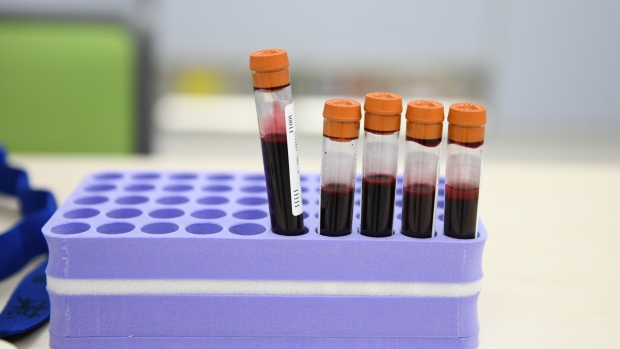May 2, 2024
Khosla, VCs Plow $100 Million Into Blood Test Startup Using AI
, Bloomberg News

(Bloomberg) -- Blood-testing company Karius Inc. raised $100 million in a new funding round from investors, and will use the cash to get its technology for detecting hard-to-identify infections into more hospitals.
The funding round was led by existing investor Khosla Ventures alongside 5AM Ventures and Gilde Healthcare. The company declined to give its valuation.
Redwood City, California-based Karius’ blood tests look for pathogens by comparing fragments of microbial DNA with a database of 20,000 genomic references, essentially an atlas of bacteria, parasites and more. The tool can usually hone in on the infection within 26 hours, the company said, considerably shorter than many hospital tests.
To help analyze data quickly, the company technology uses artificial intelligence — a still-nascent technology in medical contexts, but one that some researchers say could someday result in big improvements for patients.
Karius is led by Chief Executive Officer Alec Ford, who joined in October 2020. The company’s latest funding haul is smaller than the $165 million it raised in early 2020, part of a deal led by SoftBank’s Vision Fund II, a firm known for writing big checks. The lower number reflects a new reality facing many startups, even those using AI tools: A tough financing climate means that they may not be able to raise as much money as they did in the past.
Investors say the situation doesn’t reflect the fundamentals of Karius’ business. “What a fair price means in different markets does vary,” said Alex Morgan, a partner at Khosla, who is joining Karius’ board. “We’re always trying to invest in good technology when we see it at good prices.”
Ford said he’s confident that the company will win more of the medical testing market, an industry currently plagued by inefficiencies. Many cancer patients die from an infection caught while they are undergoing treatment rather than from the underlying cancer, he said, in part because it takes so long to identify infections in this group. Ford’s sister was hospitalized more than a dozen times with infections during her treatment for inflammatory breast cancer, he said. She died from the disease several years ago.
Today 3 million patients with cancer, or an immunocompromising health condition such as rheumatoid arthritis, get admitted to hospitals annually with a suspected infection, according to Karius. They often get treated with multiple antimicrobials while doctors conduct a battery of tests to identify the problem. The tests can be time consuming, inaccurate and invasive, particularly in the case of the bronchoscopies used for lung fluid samples.
While blood testing startups are still working to escape the shadow of Theranos, the $9 billion startup that collapsed in scandal, several companies are still working in the industry and related fields.
Khosla’s Morgan compared Karius’ process to detectives using DNA to identify who was at a crime scene, rather than using gumshoe tactics like dusting for fingerprints. “There’s lots of perpetrators making people sick,” he said. “It’s a transformation for how we investigate.”
The company is already using its tests in 400 hospitals, including the MD Anderson Cancer Center and Memorial Sloan Kettering Cancer Center. For now, the tests are usually run in addition to traditional diagnostics so doctors can evaluate Karius’ efficacy.
(Corrects the name of Gilde Healthcare in the second paragraph.)
©2024 Bloomberg L.P.





